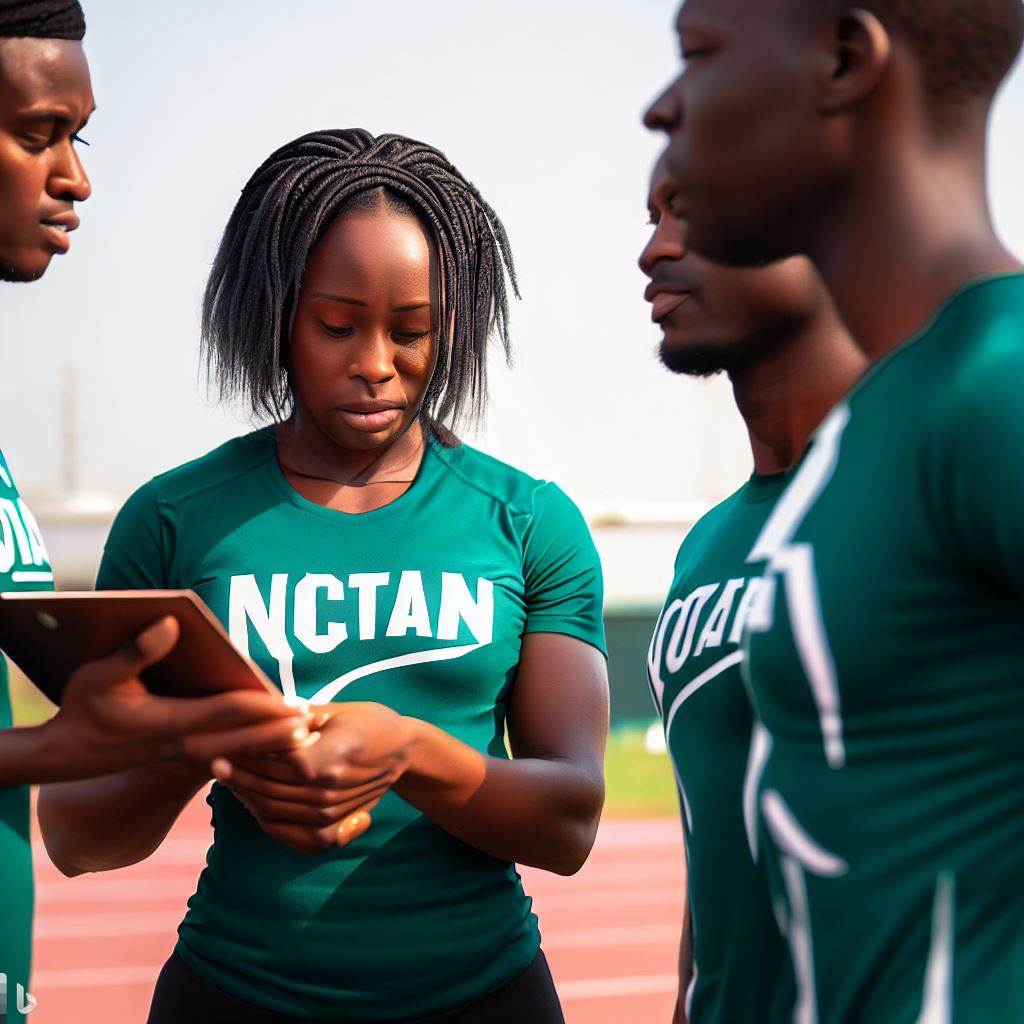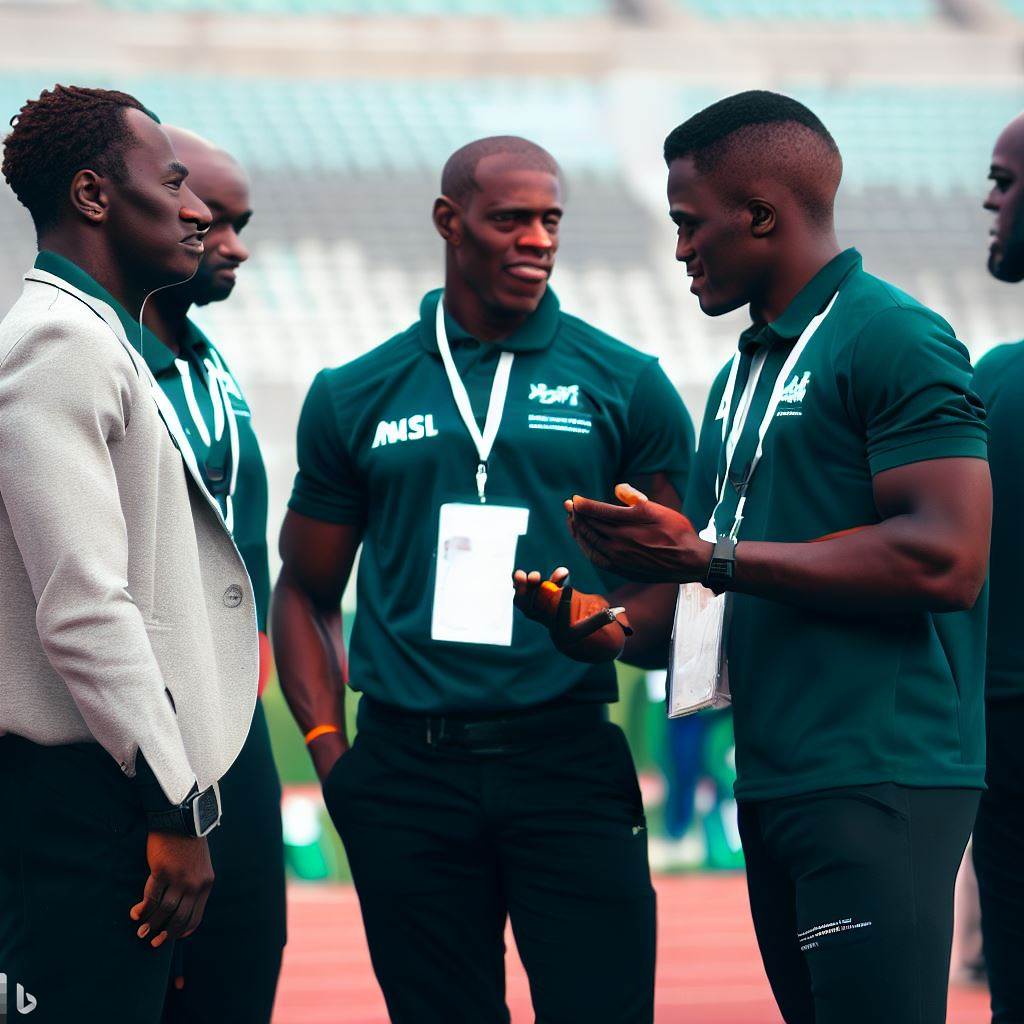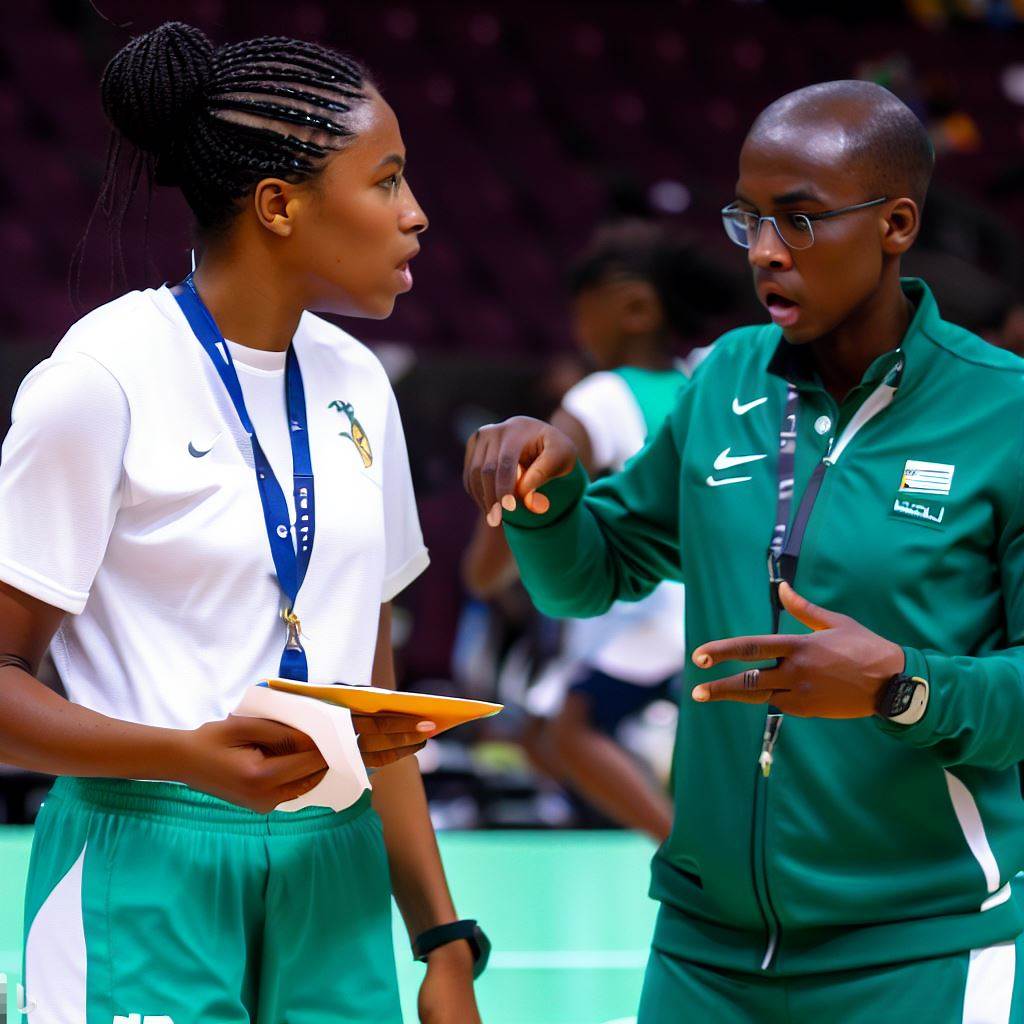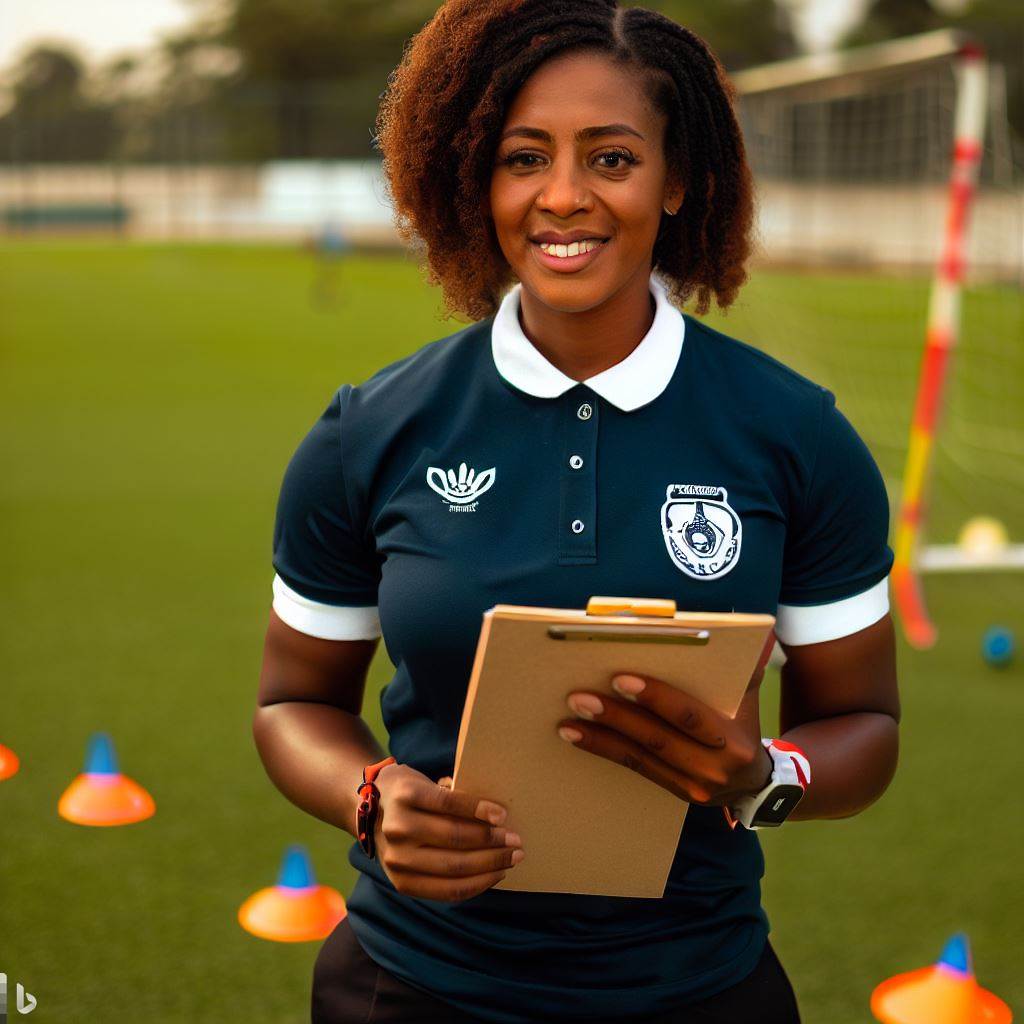Introduction
Embark on a journey with valuable insights on how to start a assistant athletic trainer career in Nigeria.
A. Brief explanation of the field of assistant athletic training
Assistant athletic training involves injury prevention, rehabilitation, and healthcare for athletes.
Learn more about this crucial role in Nigeria’s sports industry and how to start a assistant athletic trainer career in Nigeria
B. Increasing popularity and demand for athletic trainers in Nigeria
The increasing popularity of sports in Nigeria has led to a surge in demand for athletic trainers.
Explore the exciting opportunities in this burgeoning field and why it’s a great time to start a career as an Assistant Athletic Trainer.
C. Purpose of the blog post
This blog post is a roadmap to how to start a assistant athletic trainer career in Nigeria, offering step-by-step guidance and insights for success.
Understanding the Role of an Assistant Athletic Trainer
In the journey to explore how to start an assistant athletic trainer career in Nigeria, let’s first grasp the essential role.
A. Definition and responsibilities of an Assistant Athletic Trainer
- An assistant athletic trainer is a healthcare professional who works alongside the head athletic trainer.
- The responsibilities include evaluating and treating injuries, implementing injury prevention programs, and maintaining medical records.
- They also collaborate with coaches, physicians, and athletes to create effective rehabilitation plans.
- Assistant athletic trainers provide immediate care during practices and games, ensuring the well-being of athletes.
B. Importance of assistant athletic trainers in supporting the overall health and performance of athletes
- Assistant athletic trainers play a crucial role in promoting the overall health and well-being of athletes.
- They contribute to the prevention, assessment, and management of injuries, ensuring athletes can perform at their best.
- By providing immediate care, they aid in the quick recovery of athletes, minimizing the impact of injuries.
- Assistant athletic trainers also educate athletes on injury prevention strategies and proper athletic conditioning.
- Their presence instills confidence in athletes, knowing that they have a professional supporting their physical needs.
C. Overview of the skills and qualifications required for the role
- An assistant athletic trainer should possess a bachelor’s degree in athletic training or a related field.
- They must be certified by the National Athletic Trainers’ Association Board of Certification (NATABOC).
- Strong knowledge of anatomy, physiology, and sports medicine principles is essential.
- Good communication and interpersonal skills are necessary to effectively collaborate with athletes, coaches, and medical professionals.
- Assistant athletic trainers should also be skilled in evaluating injuries and developing appropriate treatment plans.
- They must stay updated with advancements in sports medicine and participate in continuing education programs.
- Previous experience working with athletes, either through internships or volunteer work, is highly valued.
- Being physically fit and capable of handling the demands of sports settings is necessary.
Academic and Educational Requirements
A. Recommended Educational Pathways to Become an Assistant Athletic Trainer
- Start by completing a high school diploma or its equivalent.
- Focus on science-related subjects such as biology, anatomy, and physiology.
- Participate in extracurricular activities that involve sports or athletic training.
- Consider volunteering or shadowing an athletic trainer to gain practical experience.
- Research universities or colleges that offer accredited athletic training programs.
B. Relevant Bachelor’s or Master’s Degree Programs in Sports Medicine or Athletic Training
- Pursue a Bachelor’s degree in Athletic Training or a related field such as Sports Medicine.
- Look for programs that are accredited by the Commission on Accreditation of Athletic Training Education (CAATE).
- Coursework may include topics like injury prevention, emergency care, therapeutic modalities, and rehabilitation techniques.
- Consider completing a Master’s degree in Athletic Training for advanced knowledge and specialization.
C. The need for Certifications
1. Certifications from the National Athletic Trainers’ Association (NATA)
- Obtain certification from the NATA to enhance your credibility as an assistant athletic trainer.
- The Board of Certification (BOC) exam is required to become a certified athletic trainer.
- Fulfill the NATA’s educational, clinical, and practical requirements to be eligible for the exam.
- Stay updated with continuing education courses to maintain your certification.
2. Additional Certifications and Continuing Education
- Explore additional certifications related to specialized areas like strength and conditioning or sports nutrition.
- Consider attending workshops, conferences, or seminars to expand your knowledge and network with professionals.
- Stay informed about the latest research, techniques, and advancements in athletic training.
- Engage in professional development activities to improve your skills and stay competitive in the field.
3. Professional Experience and Internships
- Seek internship opportunities with sports teams, athletic departments, or rehabilitation centers.
- Gain hands-on experience in evaluating and treating athletic injuries under the supervision of a certified athletic trainer.
- Network with professionals in the field and seek mentorship to enhance your learning and career prospects.
- Build a strong portfolio by documenting your experiences, including any research projects or presentations.
4. Importance of Continuing Education and Skill Development
- Understand the significance of staying updated with the latest advancements in sports medicine and athletic training.
- Continuing education ensures you maintain competency in providing quality care to athletes.
- Attend workshops, seminars, and conferences to learn new techniques and treatment modalities.
- Keep up with industry standards and best practices to remain at the forefront of athletic training.
Aspiring assistant athletic trainers in Nigeria should consider following the recommended educational pathways, including completing a high school diploma with a focus on science-related subjects.
Pursuing a Bachelor’s degree in Athletic Training or a related field is crucial, and programs accredited by CAATE should be prioritized.
Obtaining certification from the NATA through the BOC exam is essential for credibility in the field.
Additional certifications, continuing education, and practical experience through internships are highly recommended to enhance skills and stay competitive.
Continuing education ensures the ability to provide quality care while staying updated with industry advancements.
Read: Top Challenges Faced by Nigerian Athletes Today
Gaining Practical Experience
A. Significance of hands-on experience in the field
- Hands-on experience is crucial for aspiring assistant athletic trainers in Nigeria.
- It allows them to apply theoretical knowledge to real-life situations.
- Practical experience helps in understanding the challenges and demands of the job.
- It provides opportunities to develop critical thinking and problem-solving skills.
- Working with athletes enhances communication and interpersonal skills.
B. Volunteering opportunities with sports teams or local sports clinics
- Volunteering with sports teams or local sports clinics is an excellent way to gain experience.
- It allows aspiring trainers to observe and learn from experienced professionals.
- Assisting with medical assessments and treatments can provide hands-on learning.
- Volunteering builds a network of contacts within the sports industry.
- Working with diverse athletes helps develop cultural sensitivity and adaptability.
C. Benefits of internships or apprenticeships with athletic trainers or sports organizations
Internships and apprenticeships offer structured professional learning with experienced athletic trainers, providing invaluable mentorship.
Interns gain exposure to various sports and injuries, honing practical skills under supervision and receiving feedback for continuous improvement.
Connections forged during internships often lead to future job opportunities, making them a valuable step for aspiring assistant athletic trainers in Nigeria.
Practical experience is essential, allowing application of theoretical knowledge to real-life scenarios.
It fosters understanding of job challenges, cultivates critical thinking, problem-solving, and enhances communication and interpersonal skills through athlete interaction.
Volunteering with sports teams or local clinics is a great start, offering exposure to experienced professionals and hands-on learning opportunities.
This also builds a network of industry contacts and cultural adaptability by working with diverse athletes.
Internships and apprenticeships with sports organizations provide structured learning in a professional setting, closely guided by experienced trainers.
Interns gain exposure to various sports and injuries, practicing skills under supervision and receiving valuable feedback for growth.
These experiences often lead to future job opportunities, making them essential for aspiring assistant athletic trainers.
In summary, practical experience is vital for Nigerian assistant athletic trainers.
Volunteering and internships provide hands-on learning, essential skills development, and valuable industry connections.
Read: Steps to Building a Career in Nigeria’s Sports Field

Building Professional Networks
A. Importance of networking in the sports industry.
Networking plays a crucial role in establishing a successful career in the sports industry.
It allows assistant athletic trainers to connect with like-minded individuals, learn from experienced professionals, and explore new opportunities.
To build a strong professional network, assistant athletic trainers in Nigeria must actively engage in various activities and events within the industry.
Attending conferences, workshops, or seminars related to athletic training is an excellent way to expand one’s professional network.
These events provide opportunities to meet experts in the field, learn about new research and advancements, and establish meaningful connections.
B. Suggestions for Attending Conferences, Workshops, or Seminars Related to Athletic Training.
When attending such events, assistant athletic trainers should make an effort to introduce themselves to other attendees, participate in group discussions, and exchange contact information.
Following up with new connections after the event is also essential to maintain the relationship.
C. Joining Professional Organizations, such as the Nigerian Athletic Trainers Association.
Additionally, joining professional organizations can significantly contribute to the growth of an assistant athletic trainer’s network.
The Nigerian Athletic Trainers Association is an excellent example of a professional organization that provides a platform for networking and skill development.
Being part of professional organizations allows assistant athletic trainers to attend exclusive events, access valuable resources, and engage with industry leaders.
Through these platforms, they can share experiences, seek advice, and build relationships with colleagues in the field.
Networking is not just limited to attending specific events or joining organizations.
Assistant athletic trainers should also utilize online platforms, such as social media and professional networking sites, to connect with individuals in the sports industry.
Platforms like LinkedIn offer opportunities to showcase expertise, join relevant groups, and engage in meaningful discussions.
By actively participating in online communities, assistant athletic trainers can expand their network beyond geographical boundaries.
When networking, it is crucial to approach interactions with a genuine interest in others and a willingness to help, rather than solely focusing on personal gain.
Building authentic and mutually beneficial relationships is key to long-term success.
Moreover, networking is not a one-time activity but an ongoing process that requires consistent effort and nurturing.
Assistant athletic trainers should regularly attend industry events, stay updated on industry news, and actively contribute to the community.
In review, building professional networks is essential for assistant athletic trainers in Nigeria seeking to establish a successful career in the sports industry.
By actively participating in events, joining professional organizations, and utilizing online platforms, they can expand their network, learn from experienced professionals, and open doors to new opportunities.
Read: Rising Stars in Nigeria’s Sports and Athletics Scene
Securing Employment as an Assistant Athletic Trainer
A. Job Prospects and Career Advancement Opportunities in Nigeria
- Nigeria offers numerous job prospects for assistant athletic trainers due to the growing interest in sports.
- The demand for athletic trainers is increasing in both professional teams and local sports organizations.
- With the rise of sports facilities and leagues, there are ample opportunities to work in sports medicine.
- As the field of athletics continues to develop, career advancement options are also expanding in Nigeria.
- Experienced assistant athletic trainers can progress to higher positions, such as head athletic trainer or sports medicine director.
- Furthermore, they can build their reputation and expertise by working with successful athletes or teams.
B. Crafting a Compelling Resume and Cover Letter
- Start by highlighting relevant education, certifications, and any previous experience in athletic training.
- Include information about internships, workshops, and any specialized training you have received.
- Emphasize your skills in injury evaluation, prevention, treatment, and rehabilitation.
- Demonstrate your ability to work well with athletes and teams, emphasizing effective communication and interpersonal skills.
- Use action verbs and quantify achievements to showcase your impact in previous roles.
- Tailor your resume and cover letter to each job application by highlighting specific requirements and skills.
C. Finding Job Openings
- Tap into online platforms dedicated to sports and job listings for the latest openings in athletic training.
- Follow sports organizations and teams in Nigeria on social media to stay updated on job announcements.
- Utilize professional networking platforms like LinkedIn to connect with sports industry professionals.
- Attend local sports events, seminars, and conferences to expand your professional network.
- Leverage personal connections and reach out to coaches, trainers, and sports professionals for potential job leads.
- Consider volunteering or offering services for free initially to gain experience and make valuable connections.
Generally, securing employment as an assistant athletic trainer in Nigeria comes with promising job prospects and possibilities for career advancement.
The growing interest in sports and the development of sports facilities provide ample opportunities for aspiring athletic trainers.
Crafting a compelling resume and cover letter that highlight your relevant education, certifications, and experience is crucial.
It is also important to leverage various methods for finding job openings, such as online platforms, local sports organizations, and personal connections.
By utilizing these strategies, aspiring assistant athletic trainers in Nigeria can increase their chances of finding fulfilling employment in the field.
Read: Starting Your Journey in Nigeria’s Athletics Profession
Developing Key Skills for Success
A. Essential skills for assistant athletic trainers
- Communication
- Problem-solving
- Critical thinking
B. Recommended ways to enhance these skills
- Continuing education programs: Attend workshops, seminars, and conferences to stay up-to-date with industry advancements.
- Engaging in teamwork: Collaborate with other healthcare professionals and athletes to develop effective treatment plans.
- Seek feedback: Regularly ask for input from supervisors and colleagues to identify areas for improvement.
C. Importance of ongoing professional development and learning
Staying updated is vital; keep abreast of the latest research, tech, and techniques in the field of athletic training.
Expand knowledge through advanced certifications, deepening expertise in areas relevant to the role.
Networking helps; connect with industry peers for knowledge exchange and shared experiences.
Seek mentorship from experienced athletic trainers; their insights are invaluable for your growth.
Continuously reflect on your performance, learn from mistakes, and adapt for ongoing improvement.
Developing key skills is crucial; they enable effective communication, essential for working with athletes, coaches, and healthcare professionals.
These skills ensure quality care, vital during athletes’ training, practice, and competitions.
Communication skills are essential; conveying instructions, discussing injuries, and building relationships are vital aspects of the role.
Assistant athletic trainers should simplify complex medical concepts, actively listen to athletes, and address their concerns effectively.
Problem-solving is necessary; assessing injuries, devising treatment plans, and making quick decisions during emergencies require this skill.
Critical thinking is vital for evaluating information, interpreting research, and making informed judgments in athlete care.
Continuing education is key; participate in programs to stay updated on sports medicine, rehabilitation, and injury prevention.
Teamwork enhances skills; collaborating with healthcare professionals and athletes fosters holistic care and interpersonal growth.
Ongoing learning is a must; seek opportunities through conferences, workshops, and certifications.
Networking with industry professionals provides insights and growth chances, while mentorship offers guidance from experienced trainers.
Reflection and adaptation are essential; evaluate performance, seek feedback, and make adjustments for continuous improvement.
In Nigeria, developing skills like communication, problem-solving, and critical thinking is paramount for assistant athletic trainers’ success.
Through professional growth and active learning, they can provide exemplary care and stay relevant in this dynamic field.
Conclusion
A. Recap on the steps for starting a career as an assistant athletic trainer in Nigeria
- Earn a bachelor’s degree in athletic training or a related field.
- Gain hands-on experience through internships and volunteer opportunities.
- Obtain certifications such as the BOC exam and Nigerian Athletic Trainers Association membership.
- Network and make connections within the sports industry in Nigeria.
B. Rewards and challenges of the profession
The rewards of being an assistant athletic trainer in Nigeria include the opportunity to work with talented athletes, contribute to their performance and recovery, and be part of a dynamic sports community.
However, the profession also has its challenges, such as long hours, demanding schedules, and the pressure to deliver results.
C. Encouragement for aspiring trainers
Aspiring trainers should persevere and seize opportunities to make a positive impact in the sports industry.
By staying dedicated, continuously learning, and building relationships, they can thrive in their careers and contribute to the growth and development of athletics in Nigeria.




